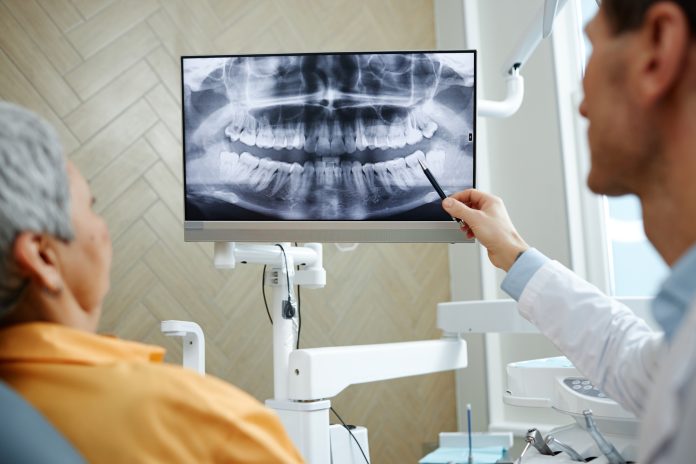Maintaining oral health is essential for well-being and quality of life as people age. All-On-4 dental implants have emerged as a game-changing solution, especially for seniors looking for a sturdy, long-lasting alternative to traditional dentures. This article will help you consider if it’s the ideal dental implant choice for your senior loved one, so keep reading to learn more.
Understanding All-On-4 Dental Implants
All On 4 dental implants are a popular teeth replacement solution. Unlike traditional dentures that rest on the gum’s surface, All-On-4 implants are anchored into the jawbone. This means four implants support an entire arch of teeth, giving a more stable and natural feel. The procedure requires minor surgery, where these implants are precisely positioned in the jawbone to provide a firm foundation for the new set of teeth.
Pros Of All-On-4 Implants For Seniors
-
Improved Oral Function
With All-On-4 implants in place, eating becomes a pleasure again. Some seniors may find it challenging to eat foods that require rigorous chewing or biting, like apples or steak. All-On-4 restores this function, allowing seniors to enjoy their favorite meals without hesitation. Over time, this can improve nutrition and overall health by expanding dietary options.
-
Improved Aesthetics
Nothing beats a genuine smile, and All-On-4 implants deliver just that. They blend seamlessly with natural teeth, providing a complete, radiant smile. Unlike some traditional dentures, which might not always match the natural appearance of the patient, All-On-4 implants can enhance confidence in one’s smile, potentially helping some seniors feel more at ease in social settings. This benefit may also lead to improved mental health.
-
Convenience
All-On-4 implants have a different maintenance routine than traditional dentures. There’s no need for messy adhesives or the nightly ritual of removing dentures for cleaning. Seniors can brush them just like natural teeth. This convenience means fewer worries and more time to enjoy life.
-
Durability
These implants are durable and can last for many years. Made from robust materials, they resist wear and tear, handling the daily pressures of biting and chewing. Traditional dentures might require occasional adjustments or replacements, but with proper care, All-On-4 implants remain reliable for years.
-
Longevity
Investing in All-On-4 implants is a long-term decision. While there’s an initial cost, the implants often outlive their traditional counterparts. Designed for long-term use, these implants can potentially reduce the number of dentist visits for adjustments or replacements.
Cons Of All-On-4 Implants For Seniors
-
Cost
There’s no denying that All-On-4 implants have a heftier price tag than traditional dentures. The initial investment can be daunting for some seniors, especially those on fixed incomes. Think of it as a long-term investment in comfort and appearance. Consult with the dental clinic about payment plans or insurance coverage options to alleviate some financial concerns.
-
Surgery
The installation of All-On-4 implants requires a surgical procedure. While it has a high success rate, like any surgery, it carries risks. Anesthesia, potential infections, or complications are aspects to consider.
-
Recovery Time
After the procedure, there’s a healing period. During this time, seniors might experience discomfort, swelling, or bruising. While these side effects typically subside within a few weeks, the initial days post-surgery can be challenging for some.
-
Risk of Complications
As with all medical procedures, there’s a chance of complications. These could include implant failure, infections, or issues with the fit of the new teeth. However, with experienced dental professionals and proper post-op care, these risks remain minimal.
Is All-On-4 the Right Choice for Your Senior?
Before leaping into any dental decision, it’s crucial to weigh the benefits against potential drawbacks. All-On-4 implants offer transformative results, but they might not be the best fit for everyone. There are factors you must consider:
-
Age
The decision isn’t solely based on age but also on overall health. While many seniors are ideal candidates, it’s bone density and oral health that play a more significant role. A thorough examination will determine if All-On-4 is a feasible option.
-
Health
Underlying health conditions, such as heart issues or diabetes, could impact the recovery process. It’s important to discuss any medical concerns with the dentist to understand the feasibility and safety of the procedure.
-
Lifestyle
All-On-4 implants are one type of dental implant that can offer added convenience for seniors who are active and have specific dietary preferences. The implants allow seniors to eat, laugh, and speak without hesitation.
-
Budget
While the initial cost is higher, the long-term benefits often justify the investment. Factor in the reduced need for adjustments, replacements, or daily maintenance when considering the price.
When making the decision, focus on the individual needs and lifestyle of your senior. It’s about enhancing their quality of life that aligns with their personal preferences and health considerations.
Alternatives And Other Considerations
Traditional dentures remain a popular choice for many seniors. They’re less invasive and more budget-friendly. Dental bridges, while pricier, are another option. They bridge the gap where teeth are missing, anchored by natural teeth or implants on either side. Mini dental implants, smaller than traditional ones, offer yet another alternative.
While each option has its advantages, it’s essential to compare them to All-On-4 implants in terms of cost, durability, and maintenance. Always consult a dental professional. They’ll provide guidance based on the senior’s unique circumstances.
Conclusion
Maintaining oral health is essential at every age, including the senior years. As you decide between All-On-4 implants or other dental solutions, consider the individual needs and preferences of your loved one. Reach out to a dentist whose expertise will guide you toward an informed decision, aiming for a bright and healthy smile for your senior loved one.






















